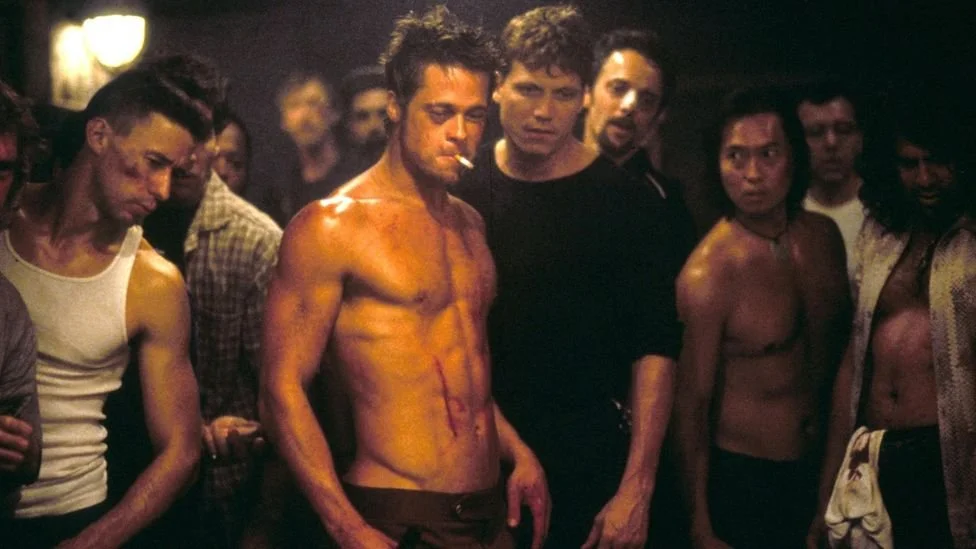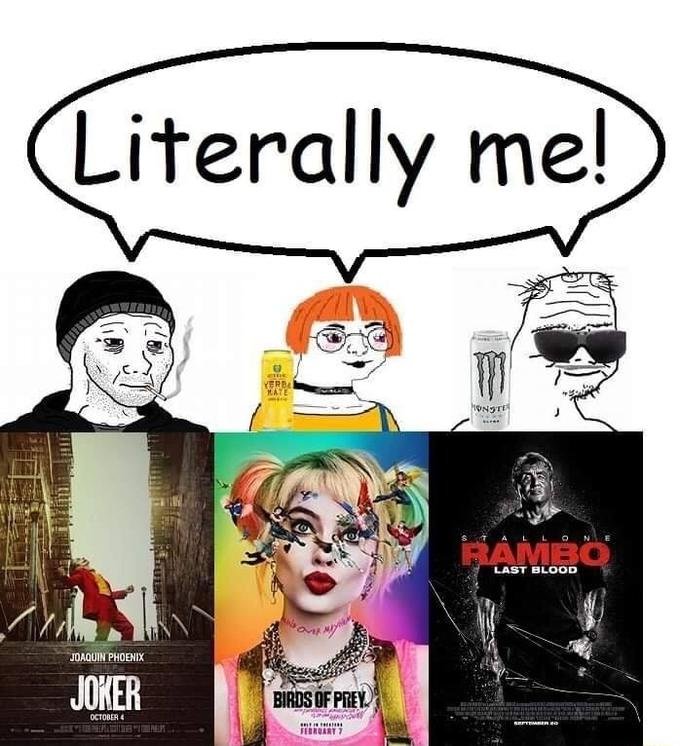The Subtle Pleasures of Sigma Cinema
He’s literally me.
The online memes have been all the rage this year. They’ve apparently been around since 2018, but what I suppose was a fringe phenomenon has only been gaining momentum since. You know what memes I’m talking about. The self-deprecating memes where characters meant to represent us overidentify with pop culture characters no one has no business identifying with.
This phenomenon was mostly created and is still mostly being driven by something that existed for a long time, but is gaining recognition and classification under a new name : sigma cinema. A brand of cinema where strong, smart, but quiet and rebellious characters take matters into their own hands, give the middle finger to society or decide to act in a way they perceive to be moral against perceived failures of the system in a cold, uncaring world.
I’m sure this rings a bell already: Patrick Bateman’s senseless murderous sprees in American Psycho, Lou Bloom professional ascension in a business full of soulless sharks in Nightcrawler, the driver’s silent crusade to deliver Irene from her husband’s criminal past in Drive, etc. It’s not really what the character does, but it’s the type of person he is (because it IS a heavily gendered phenomenon and I’m only going to talk from a place of knowledge here, hence men). The lonely, but resourceful characters who decide to face the system on their own terms.
I know the common analytical reading is that these characters are bad and these films aren’t meant to be loved or replicated without critical thought and that analytical reading is valid. These is nothing dumber than a guy modeling his personality and behavior on Fight Club’s Tyler Durden. Not only is Tyler Durden not a real person, but he’s also not real in the context of Fight Club. He’s an idea. But like its author Chuck Palahniuk says himself in the oddly real and emotional grounded Fight Club 2: "Human beings don't cultivate ideas. On the contrary...ideas cultivate us."
But you know what? I kind of love these characters. I don’t overidentify with them anymore (I might have never did or at least never acknowledged it to myself), but I’m not ready to let them go and declare them improper for society. This is a 100% emotional thing. But what’s going on with this? Why do I like these guys so much?
Fight Club and the unofficial birth of sigma cinema
Sigma cinema was not born with Fight Club. If there is any starting point to it, Stanley Kubrick’s A Clockwork Orange or Martin Scorcese's Taxi Driver have a paternity claim for the genre. But Fight Club was the starting point for me and many other young men of my generation. It felt empowering. It was the first time a movie didn’t suggest that I improved myself, morally, emotionally or physically. Fight Club’s argument, eloquently told by Brad Pitt one third into the movie, is that: “self improvement is masturbation, now self destruction…”
Now, I lived in a small, isolated city of 6,000 people when Fight Club came out. A rather conservative, idiosyncratic place where kids my age judged each other (and were judged) according to arbitrary criteria such as athleticism, propensity to violence, ability to drink before passing out or being sick and irresponsible behavior or all sorts. If you could gracefully engage in these activities without ever looking bothered in the least, you were a real man. Someone other people your age (or older) would look up to. I wanted to be like that. In a certain distant, reptilian way, I feel like I still want to be like that. That it really shaped masculinity for me. But it wasn’t who I was or who I’ve become. Fight Club had a thing to do with this.
This is when I had my first sigma moment: Fight Club made me want to either become strong or destroy myself. I gave an ultimatum to the hand I was dealt by destiny and guess what? Kind of both happened. I became strong. I had the wherewithal to move out of town for college, train in martial arts and become a Brazilian jiu-jitsu purple belt. But I literally killed my self. I went where no one knew me, where I could be anyone I wanted and beat the weakness out of myself. Today, if I have a swanky media job, a home, a wife and a dog, it’s because of Fight Club. In a way, I lived through my own sigma story.
I believe this is the value in these movies. Of course, they can’t be taken at face value. Although I really liked the part in Fight Club where men punch each other in the face, I never quite saw the interest in the Project Mayhem shenanigans. Nothing against anarchy, but it was not the system I wanted to beat. It was my own limitations.
The very purpose of art is to inspire. Inspire other artists, but also blaze imaginary pathways to how the audience can improve, modify or better tailor their lives to their own needs. When I saw Tyler Durden, I didn’t want to become him. But I wanted to be strong and eloquent like him. He was not a model, but rather a distant north star I wanted to pursue within the confines and the context of my own life. I would never end up as strong and eloquent as Durden, because I’m not him. No one is. But it led me somewhere safe and fruitful.
He was never literally me, but he became a part of me.
Degree Zero of Sigmatude
Of course, Tyler Durden is a very constructive example of a sigma character. Some of them are rather irredeemable. For example, I have no idea why anyone would want to be Patrick Bateman. The man is wallowing in his own existential loneliness and fucked up alienation while he’s constantly watering them like flowers of disease (shout out Goatsnake). Unless you’re into cars, I don’t know why anyone would like to be the protagonist from Drive too. He is the definition of being caught in a high stress, no reward situation. He doesn’t even get laid. All he’s got is the satisfaction of having done the right thing just because he could. I guess there’s solace in that, but still. I wouldn’t want to be in that situation.
But all these characters have something in common. They did something about their situation. They took action. It’s the degree zero of sigmatude. To be a budding sigma male is wanting to change. It’s to feel utter discomfort at the idea of living life as yourself and somehow wanting something better. I understand this is also what motivates mass shooters, but the difference between cinematic sigmas and these freaks is that the characters are taking responsibility for the life they want. Even the worst of them like Travis Bickle who ends up pretty much a mass shooter himself: the important thing is not the act, but the target. Travis did a “moral” thing and destroyed a noxious situation Iris was caught in. He killed a pimp and a mafiosi. Not kids or random people on their way to the grocery store.
Travis did something. He attacked a symbol of what he deemed to be corruption of American values and you can attack something physically, but also financially, legality, philosophically. You can do something without throwing your life to the garbage. You can find purpose without sacrificing yourself, for as long as you’re willing to sacrifice your self. To evolve. To become another person than this alienated freak.
Of course, you need a certain level of judgment and a sense of self that isn’t irreparably damaged in order to process this. I was lucky to some degree. I won a genetic lottery for having common sense and whatnot. But there’s value in sigma cinema. I believe there needs to be more, not less and that creators need to hold one another accountable for sending the right messages, even at the cost of handicapping financial success. Because there is legacy value in these. There’s a reason why there are still Tyler Durden posters everywhere in the world (I saw many in Istanbul during my vacation) and you still don’t know which Marvel character played in which movie. Some art is meant to be carried along. To evolve with you. You can find purpose without hurting anybody or at least without hurting anybody that doesn't deserve shit things happening to them.
I feel like I’m fighting somewhat of an uphill battle (or not) here, but who’s with me?







